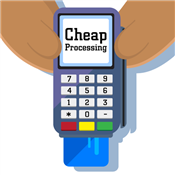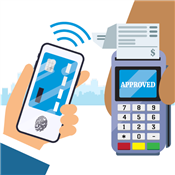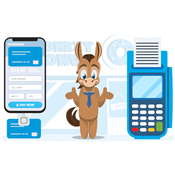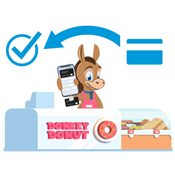How Do I Open a Merchant Account
What do you need to open a merchant account? How long does it take and how much does it cost? Here's everything you need to know.
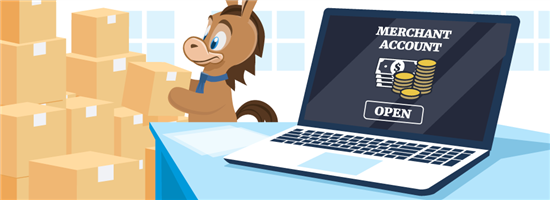 |
Looking to open a merchant account? You'll need to prove you're a legit business with consistent sales.
You have to go through an underwriting process. Essentially, the provider wants to know how risky you'll be to them.
If that sounds too complicated, don't worry. You'll learn everything you need to know about opening a merchant account. It's really not too difficult.
What is a Merchant Account?
A merchant account is a special type of account that allows you to accept credit and debit cards, whether online or in-person.
When you take a credit card payment, your processing provider helps you get approval from the various banks. The funds are first settled into your merchant account.
You don't actually get access to your merchant account. It's a "holding account" for your funds until they're transferred to your business bank account in 1-2 days.
But First, Do You Need a Merchant Account?
First things first, let's determine if you even need a merchant account. Because there are a couple of options with completely different requirements.
- Are You a New Business?
New or micro-businesses most likely cannot open a merchant account straight away. If you're processing less than $5,000 per month, stop here and look to a payment services provider instead (like Square and PayPal).This is a simpler processing solution without needing a merchant account. There's no approval and you can get started right away.
- Are You Already Processing?
If you have steady sales and/or already use a processing service, then perhaps you're ready to switch to a real merchant account. And you're wondering what is required to open one. In this case, read on.
From this point on in the article, we're talking about traditional merchant accounts, which have more rigorous requirements.
With that said, here are 8 things to know about opening a merchant account.
1. Underwriting Is Required
 |
This sounds very overwhelming! But this process is really not too scary.
Your merchant account provider takes on the risk of processing card transactions. Anytime a business accepts credit cards, there's some risk of payment fraud. When that happens, the provider first takes the loss, with the expectation that you'll pay it back later.
This is why there's an underwriting process to open a merchant account. The provider wants to verify that your business is legit and that you're a responsible owner. They want to make sure you're not using the business to accept cards for fraudulent purposes.
They determine this by looking at your personal credit history and business documents. Below, you'll find out what you need to provide.
2. You Need to Be an Official Business
 |
As mentioned earlier, merchant accounts are best for established businesses. This means you need:
- A Business License
You need an official business license from the state that you operate in. Merchant account providers will check your license to verify that your business is legit.If you're a sole proprietor, you can apply with a Doing Business As (DBA).
- Employer Identification Number (EIN)
This is used to identify your business and to report business taxes. You can apply for an EIN for free on the IRS website. The number is issued immediately. - A business Bank Account
You need a business bank account, even as a sole proprietor. This is the account where they'll deposit funds from your credit card transactions (minus processing fees). You'll need to provide your business account routing number.In most cases, you need to upload an image of a VOIDED check to confirm your business account info.
It's important for your business bank account to be in good standing. If you have a low balance or issues like overdrafts, you'll be seen as riskier.
If you've got these three things in place, you're eligible to apply for a merchant account. Next, let's go over what the provider will look at.
3. What the Provider Will Review
 |
During the approval process, some of the things the merchant account provider will review include:
Your Personal Credit History
They want to see that you, the business owner, are responsible with finances. But if you have a lower score, it doesn't mean you can't be approved. In that case, they may go off your business statements instead.
Type of Business
Some businesses are considered to have higher risk. A lot of providers don't want to work with those types. Some examples include travel companies, auto parts and accessories, financial services, and adult entertainment.
Years in Business
The longer the time, the more it proves that you've been able to stay in business and that it's legit. Fraudsters could set up new businesses to take credit cards and then quickly shut down, leaving the processor liable for all the fraud.
Previous Processing History
This tells the provider how much you usually process a month and if there are any issues. The more you need to process, the more information they may require. If you're a high-volume business, you may even need to provide up to 2 years of business financial statements.
Chargeback History
The provider will look at how often chargebacks occur and if they're valid, legit reasons. Having a lot of chargebacks means higher risk for the processor.
4. You May Need to Provide Supporting Documents
 |
Besides those main things, the provider might also request supporting documentation. They may want a deeper understanding of how you operate your business. You may be asked to provide:
- Business plan
- Billing policy
- Shipping procedures
- Guarantees and warranties
- Refund and exchange policies
- Inventory reports
- Security procedures (especially for online stores)
Basically, they're looking to see if you have the proper customer procedures in place to reduce chargebacks.
These kinds of supporting documents may not be needed for all businesses. But it's best to have them prepared just in case, to help the underwriting process go smoother and faster.
5. How Much It Costs to Open a Merchant Account
 |
Applying and getting a quote should be free. If you do decide to enter an agreement, there could be a one-time setup fee. But a lot of providers nowadays don't even charge a setup fee anymore.
If you need processing equipment, that could be a larger upfront cost depending on what you need. If you need the whole gamut (register, printer, scanner, cash drawer), that could cost thousands. If you already have the equipment, ask if the provider can reprogram it for free.
Once you have your account up and running, you'll be responsible for fees like:
- Processing fee for each transaction
- Monthly fees for various services (such as payment gateway, PCI compliance)
- One-time incidental fees (such as chargebacks)
In general, you can expect the overall cost to be 2.5% - 3.5% of your processing volume. This means if you have $10,000 in credit card sales each month, your processing costs will be $250 - $350.
For high-risk businesses, your processing fees will be higher to offset the risk to the providers. The overall cost will probably be more like 3.5% - 5%.
6. Opening an Account Could Just Take a Day
 |
If you have good credit and your business is easily verified, you could be approved in as little as one to two days.
You'll be set up with a merchant account and can start accepting online payments almost immediately. You can start taking in-person payments as soon as you get your equipment.
If you have bad credit, your business is more complex, or is considered high risk, it could take a few weeks. They may require more info and perform a deeper scrutiny.
7. You May Have a Processing Limit
 |
On your application, you'll be asked your estimated processing volume each month. And if you already have processing history, the provider will look at that too.
They'll use the information to assign a processing limit. This is to limit their own risk.
Try not to exceed your processing limit, especially as a new client. You want to build trust with your merchant account provider. You can increase your processing limit as you develop a good relationship.
8. Review Your Merchant Account Agreement
 |
Reading all the pages of fine print is super-tedious. But it's important to carefully review the terms and conditions before signing. You don't want to be surprised by hidden fees or be stuck in a bad contract.
Look for things like:
- Processing rates
- Account and service fees
- Processing minimums and limits
- Chargebacks and how they're handled
- Any fees that you don't understand
- Contract length (it's best to find a no-contract provider)
- Cancellation policy
It's important for you to understand all the possible costs that may come up. If there's anything you don't understand, ask the provider. They should be able to explain clearly.
If there's something you're not happy with, this is the time to negotiate or back out completely. Negotiate the terms and fees with the processor before signing. Read our detailed guide to learn more.
Where to Open a Merchant Account
When you're ready to open a merchant account, you have these options:
- Through your bank. Lots of banks offer merchant services. You may consider your bank if you want to have business banking and processing under one roof. But the pricing and terms are not always transparent.
- With a merchant account provider. These companies specialize in providing merchant services. Some examples are Dharma and Payment Depot. The pricing is more competitive and transparent.
- A payment services provider (PSP). PSPs let you process cards without a full-fledged merchant account. They don't require underwriting, so they're ideal for new businesses. Popular examples are Square and PayPal. We'll go over this in more detail next.
Merchant Account Alternatives
If you're a new or very small business (processing less than $5,000/mo), consider a third party payment services provider (PSP) instead. They offer a simpler way to process cards without a merchant account.
There's no approval process, so you can just apply for an account, order equipment, and start accepting cards right away.
Some popular alternatives are:
Square
Square is known for its sleek white machines and powerful POS app. The app lets you accept cards anywhere, track inventory and employees, manage customer database, and more. It's ideal for small mobile businesses, retailers, and food services.
PayPal
A huge advantage of PayPal is that customers can pay with PayPal and Venmo on your website and even in-person via QR code. It's a good choice for small online stores that want to offer more payment choices.
Stripe
Stripe is perhaps the most powerful payment processor for online businesses. You can create a completely customized checkout experience. It's good for eCommerce stores, subscription services, and in-app purchases.
Takeaways / Checklist for Opening a Merchant Account
The merchant account underwriting process may seem daunting, but it's not as bad as it sounds. The provider just wants to know that your business is legit and how much risk you'll pose. It can be done in as little as a day.
Here is a final checklist of the things you will need to open a merchant account:
- Business license
- Employee Identification Number
- Business bank account
- Business info (type, sales volume, years in business, etc.)
- Business financial statements
- Previous processing statements
- Supporting documents (business plan, billing policy, return policy, etc.)
It's important to work with a provider who will make you feel comfortable during this process. Make sure the provider is completely transparent about their fees and policies.
Anna G is a research director at CreditDonkey, a credit card processing comparison and reviews website. Write to Anna G at feedback@creditdonkey.com. Follow us on Twitter and Facebook for our latest posts.
Note: This website is made possible through financial relationships with some of the products and services mentioned on this site. We may receive compensation if you shop through links in our content. You do not have to use our links, but you help support CreditDonkey if you do.
Not sure what is right for your business?
|
|
|
Answer a few short questions in our credit card processing quiz to receive tailored recommendations to help you keep more profits.
|
|
| ||||||
|
|
|



